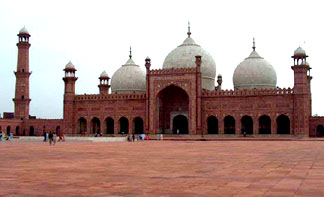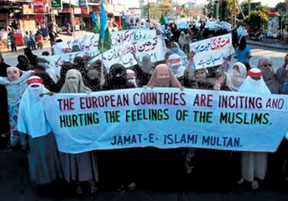|
observer |
|
|
|
|
|
OTHER LINKS |

|

|

|
No consensus on Islam even in Pakistan
Inside is the tomb of this mystic and it is reached through a busy square full of small shops with crates of Pepsi and 7Up piled up outside, far removed from the smart boutiques, ice cream parlours and burger joints of the capital itself. As you walk towards the shrine, young children tug at your clothes offering to sell you a deig - literally, a pot, usually of rice or meat, which is then distributed free to other pilgrims. Every May, the site fills to capacity as the followers of the shah arrive to commemorate the anniversary of his death. Famously, women put on dozens of cheap bangles and smash them on stones, drawing blood, in a ritual act of devotion.
People who visit the shrine pray to the shah, rather than directly to Allah. Wine and cannabis are frequently used by pilgrims striving for a state of religious ecstasy. But not only do similar shrines exist throughout Pakistan, this shrine and the village surrounding it are one of the few remains of the people who lived here before Islamabad began. Many other villages were relocated to create room for the new, pristine capital, but no one dared to move the shrine of the shah. This folk religion has also been transplanted into Pakistani communities abroad. Even the pages of Urdu-language newspapers in Britain run advertisements from latter-day mystics who offer to help people with problems ranging from infertility to possession. In one sense, more orthodox Muslims are right to criticise these practices; they are based on superstition and on an older-fashioned belief in the authority of the "wise man" rather than that of an impersonal god. But the popularity of these practices also helps us to understand the nature of modern Pakistan. For a start, Islam is surprisingly weak as a political force. Even though Pakistan was created explicitly as a state for Muslims, there is no agreed version of what Islam is. These mystical practices are widespread and there is also tension, which frequently grows into sectarian violence, between the Sunni and Shia communities. This creates a dilemma for Islamic parties in Pakistan. They can't claim to speak for all Pakistanis on doctrinal issues - those are divisive. On the other hand, all Pakistanis can agree on the oppression of the Muslim population in Kashmir and on other, more distant injustices. Islamic politics in Pakistan therefore focuses disproportionately on those issues and helps to create the impression that Pakistan is part of a global Muslim ummah
One man, whose children had died of cholera and other water-borne illnesses, was quoted in a Pakistani newspaper as saying his last remaining desire in life was "a clean, cold drink of water". There is little room in such a hand-to-mouth existence for talk of a global politics of jihad, but it's easy to see why it can become a consoling distraction. Alongside the poverty though, there is also an emerging middle class. And its values too, like those of the pilgrims at the shrine of Shah Abdul Latif, are far removed from those of the Islamic traditionalists. The middle class has embraced developments in the banking sector and consumer credit is booming. There is little talk of whether or not interest is haram. Western culture is also being sought out with energy and enthusiasm. Internet cafes are popular and are typically used to view pornography; they're even set up with that in mind, all the seats against the wall, all the screens surrounded by a wooden box to deter peeping toms. Pirated CDs and DVDs are available everywhere - uncensored and cheap. But while much of this may be superficial, it is easy to see how broader social changes are also on the horizon. TV drama serials, with massive audiences, are tackling issues such as the education of women and forced marriage. It's facile to assume that what's seen on screen is a direct reflection of social change, but it's also hard to deny that these fictional dramas will provide scripts and role models for real domestic struggles. Equally, politicians can draw comfort or inspiration from these other facets of Pakistani life. The culture is not as devout or puritanical as the tradi-tionalists pretend and this means that politicians from other parties should appeal openly to other constituencies. It should be clear that there are votes in broadening access to education for women, as in improving water supplies and sewage. Pakistan may continue to be critical in the struggle against radical Islam for years to come, but there are domestic struggles that are equally, if not more, important. (The Guardian) |
 Past Constitution Avenue, towards the Margala hills, lies the oldest
part of Pakistan's capital, Islamabad. Construction of the new city
began in the early 1960s, to the designs of a Greek urban planner,
Constantinos Doxiadis; but the shrine of Shah Abdul Latif was built two
centuries earlier, on the orders of the Mughal emperor Aurangzeb.
Past Constitution Avenue, towards the Margala hills, lies the oldest
part of Pakistan's capital, Islamabad. Construction of the new city
began in the early 1960s, to the designs of a Greek urban planner,
Constantinos Doxiadis; but the shrine of Shah Abdul Latif was built two
centuries earlier, on the orders of the Mughal emperor Aurangzeb.  What's surprising about the shrine is that the Islam practised here
is considered profane by the fundamentalists who are said to dominate
Pakistan.
What's surprising about the shrine is that the Islam practised here
is considered profane by the fundamentalists who are said to dominate
Pakistan.  This is far from the reality. The focus of the lives of most
Pakistanis is obviously domestic. Pakistan is a poor, corrupt country
struggling to develop economically. What I find saddest are stories of
people who die because of the lack of sanitation.
This is far from the reality. The focus of the lives of most
Pakistanis is obviously domestic. Pakistan is a poor, corrupt country
struggling to develop economically. What I find saddest are stories of
people who die because of the lack of sanitation. 







